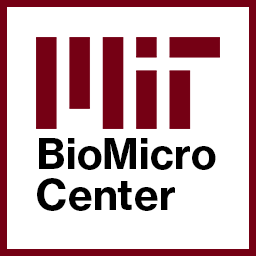BioMicroCenter:Sequencing: Difference between revisions
imported>Stuart S. Levine |
|||
| Line 14: | Line 14: | ||
== LONG READ SEQUENCING / [[BioMicroCenter:PacBio|PACBIO]] and [[BioMicroCenter:Oxford_Nanopore_Technologies|OXFORD NANOPORE]] == | == LONG READ SEQUENCING / [[BioMicroCenter:PacBio|PACBIO]] and [[BioMicroCenter:Oxford_Nanopore_Technologies|OXFORD NANOPORE]] == | ||
The BioMicro Center has made significant investments in long read sequencers. The Center has access to two separate platforms: [[BioMicroCenter:PacBio|Pacific Biosciences Sequel]] and Oxford Nanopore PromethION | The BioMicro Center has made significant investments in long read sequencers. The Center has access to two separate platforms: [[BioMicroCenter:PacBio|Pacific Biosciences Sequel]] and Oxford Nanopore PromethION P2 Solo.<BR><BR> | ||
Pacific BioSciences sequencing is no longer available at the BioMicro Center. The Center is able to provide outsourcing to sister facilities to enable access to | Pacific BioSciences sequencing is no longer available at the BioMicro Center. The Center is able to provide outsourcing to sister facilities to enable access to the REVIO.<BR><BR> | ||
[[BioMicroCenter:Oxford Nanopore Technologies|Oxford Nanopore Sequencing]] is still a new technology in the core but we are developing expertise that may be useful to researchers on campus. The center houses | [[BioMicroCenter:Oxford Nanopore Technologies|Oxford Nanopore Sequencing]] is still a new technology in the core but we are developing expertise that may be useful to researchers on campus. The center houses two Oxford Nanopore PromethION P2 Solos. Contaminants known to cause issues on the Nanopores so far include: EDTA, ethanol, isopropanol, NaCl, guanidinium chloride, guanidinium isothiocyanate, and phenol. Nanopore requests can be made through iLabs. <BR><BR> | ||
Beyond the sequencers, the [[BioMicroCenter|BioMicro Center]] has additional tools that are critical to long read sequencing. These include an [[BioMicroCenter:QC#AATI_FEMTO_PULSE|AATI FemtoPulse]] and a [[BioMicroCenter:PippinPrep|Sage BluePippin.]] <BR><BR> | Beyond the sequencers, the [[BioMicroCenter|BioMicro Center]] has additional tools that are critical to long read sequencing. These include an [[BioMicroCenter:QC#AATI_FEMTO_PULSE|AATI FemtoPulse]] and a [[BioMicroCenter:PippinPrep|Sage BluePippin.]] <BR><BR> | ||
Revision as of 19:11, 3 June 2025
HOME -- SEQUENCING -- LIBRARY PREP -- HIGH-THROUGHPUT -- COMPUTING -- OTHER TECHNOLOGY
SHORT READ SEQUENCING
ILLUMINA
The BioMicro Center provides broad support for Illumina sequencing. The Center has five high-throughput Illumina sequencers including one NovaSeq 6000, two NextSeq500s and two MiSeqs. We support a wide variety of applications, such as ChIP-Seq, miRNA sequencing and RNA-seq. Each lane can potentially accommodate dozens of indexed samples (depending on sequence complexity and desired coverage). Read lengths vary, depending on users, between 20nt and 325nt per end.
Illumina Sequencing is performed on a lane-by-lane basis instead of for a specific number of reads. This enables us to support a very broad spectrum of Illumina Library types as well as handle custom sequencing applications.
SINGULAR GENOMICS
The BioMicro Center provides support for the Singular G4 sequencing. This short read sequencer uses the similar sequencing-by-synthesis chemistry as Illumina with modest modifications. Critically, the G4 allows addressable lanes at very competitive pricing.
ELEMENT BIOSCIENCES
The BioMicro Center provides support for the Element AVITI.
LONG READ SEQUENCING / PACBIO and OXFORD NANOPORE
The BioMicro Center has made significant investments in long read sequencers. The Center has access to two separate platforms: Pacific Biosciences Sequel and Oxford Nanopore PromethION P2 Solo.
Pacific BioSciences sequencing is no longer available at the BioMicro Center. The Center is able to provide outsourcing to sister facilities to enable access to the REVIO.
Oxford Nanopore Sequencing is still a new technology in the core but we are developing expertise that may be useful to researchers on campus. The center houses two Oxford Nanopore PromethION P2 Solos. Contaminants known to cause issues on the Nanopores so far include: EDTA, ethanol, isopropanol, NaCl, guanidinium chloride, guanidinium isothiocyanate, and phenol. Nanopore requests can be made through iLabs.
Beyond the sequencers, the BioMicro Center has additional tools that are critical to long read sequencing. These include an AATI FemtoPulse and a Sage BluePippin.
SANGER SEQUENCING
The MIT BioMicro Center *does not* support Sanger sequencing. Many third party providers exist for this method. For those who prefer to utilize core facilities instead of commercial providers, Sanger sequencing is available through the DF/HCC DNA Resource at the Dana-Farber Cancer Institute

